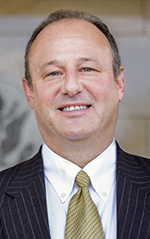The Way Ahead
Speaking Out
BY ERIC RUBIN
Speaking Out is the Journal’s opinion forum, a place for lively discussion of issues affecting the U.S. Foreign Service and American diplomacy. The views expressed are those of the author; their publication here does not imply endorsement by the American Foreign Service Association. Responses are welcome; send them to journal@afsa.org.
The modern U.S. Foreign Service observed its 100th anniversary last year. The occasion was marked by celebrations, commemorations, and retrospectives on the history and achievements of America’s diplomatic corps. Despite the cause for celebration, there were many who thought the road ahead looked difficult.
Members of the Foreign Service who served in the first Trump administration can be forgiven for assuming that the second Trump administration would proceed along similar lines. That assumption has been demonstrably disproven in the past half year.
Some Things to Consider
In that regard, here are several basic conclusions and assumptions I wish to offer for your consideration.
1. This administration has almost nothing in common with the first Trump term when it comes to the Foreign Service, American diplomacy, and the role of career, nonpartisan public servants. Like many of you, I served in the first Trump administration, first as an ambassador and later as president of AFSA.
Today, our political leadership has revealed that it does not trust or respect career public servants and considers us untrustworthy. The administration’s attitude toward international development assistance was made clear by the rapid and complete destruction of USAID.
2. The senior leadership of our foreign affairs agencies and the senior leadership at the White House appear determined to destroy the Foreign Service as we have known it since 1924. Starting with the closure of USAID, which ended thousands of careers dedicated to service, the administration has since moved at warp speed to de-staff and de-resource two more foreign affairs agencies, the U.S. Agency for Global Media and the State Department.
The Foreign Service has already lost close to a fifth of its workforce due to the “fork in the road” retirement incentives, the start of reductions in force (RIFs), and a very visible exodus of career talent at all levels.
The consequences in terms of lost capacity, lost experience, lost knowledge, and lost effectiveness cannot be exaggerated. Whether or not a significant number of posts are closed—it’s still unclear as I write this in July—our overseas presence will be a shadow of its former self, and John F. Kennedy’s vision of universal diplomatic representation will be in tatters.
And, as the cliché goes, the Chinese will eat our lunch. They are already doing so across the globe.
3. Fear is an effective tool. In fact, it seems to be the primary tool in this administration’s tool kit as far as career employees are concerned.
There are two explicit goals to instilling fear in the workforce: first, to get employees to quit or retire in large numbers to achieve the slash-and-burn reductions that have been promised, and second, to ensure that those employees who remain will be afraid to speak up, dissent, or disagree.
We have fallen so far in half a year: Before Inauguration Day, we had a Secretary of State who encouraged constructive dissent, revived the Dissent Channel, and read every message submitted through it.
4. Diplomacy has been sidelined, and with it the Foreign Service. Senior career officers, Civil Service and Foreign Service alike, have been sidelined. There are no senior career officers on the National Security Council staff following the Laura Loomer–directed purges, and there are no senior career officers in policymaking positions at State.
There are senior career officers in “Senior Bureau Official” or “Acting” positions, but these are not confirmed by the Senate and, by definition, are not policymaking jobs.
The fact that for the first time since the 19th century, the administration had not (as of early July) nominated a single career Foreign Service officer for an ambassadorship or assistant secretary position speaks volumes about the disrespect for and disregard of our career expertise and experience.
This is an unprecedented development in the 101-year history of the modern Foreign Service and offers a pessimistic perspective for Foreign Service career development in coming years.
Further, the proposed surge in defense spending, combined with the biggest proportional cuts in spending on diplomacy and development in our nation’s modern history, makes clear where the priorities lie.
5. We won’t soon recover from the devastation of the past six months, and further devastation lies ahead. Mid-level and senior expertise cannot easily be replaced and reconstituted. We can hope that a future president might ask Congress for the authority to bring back career employees who left on good terms and who want to return, but in real life, people move on. The number of those who might want to return is likely to be small.
6. We will not easily recover from the politicization of our nonpartisan, apolitical career Foreign Service. Members of Trump’s inner circle say that the Foreign Service is a hotbed of far-left radicals who hate their country and seek to undermine our elected leaders, but we know this is false. I never once saw a colleague try to undermine or fail to carry out a president’s policy instructions in my 38-plus years in the Service. Not once.
The Way Forward
All that said, it is incumbent on all of us to do what we can to prevent further destruction and to start thinking now about how we can repair the damage and reconstitute our Service in the future. USAID is never coming back, but development assistance must.
The Foreign Service will not soon resemble what it was a mere six months ago; but we know that our country needs diplomacy and needs diplomatic expertise, experience, and talent. And that is what the U.S. Foreign Service has to offer.
It is not incumbent on any of us to try to save our country from its elected leadership. Nor is any one of us responsible for the policies established by our leaders. It is a very personal decision whether to stay or to leave, but I would urge my active-duty colleagues to stay if they feel they can do so.
The next president is going to need the Foreign Service, and it will be a huge disadvantage if even more of our best talent vanishes ahead of the next election.
That said, anyone who is confronted by what they view as an illegal or immoral order must decide whether to carry it out. In the past, it was easy to request reassignment, but that may no longer be an option for most members of the Foreign Service in the current climate.
The choice may be stark. It’s a lot easier for someone who already has qualified for full retirement benefits to decide to leave than it would be for someone with less than 20 years of service. At the end of the day, it has to be an individual decision: No one should tell friends and colleagues how to navigate this scary and difficult time.
I hope that those who want to stay will be able to stay, RIFs notwithstanding. But I also have enormous respect for those who decide they cannot.
Finally, in unity there is strength. If anyone was skeptical about the need for AFSA and for union representation in January, I hope that few are today. AFSA has spoken out forcefully and has won battles that individual employees could not possibly fight.
This includes retired members of the Foreign Service as well. Membership is voluntary, but now more than ever active-duty and retired members of the Service need to stick together on the long road ahead.
Retired members of the Foreign Service can, of course, choose to remain aloof from the current crisis, but I would argue that in doing so, they are failing to respond to the destruction of their life’s work.
Our retired colleagues are free to speak and act in so many ways denied to active-duty employees. I hope more retired members of the Foreign Service will join efforts to save our Service, save our colleagues’ jobs, and save American diplomacy.
Unwarranted optimism is not helpful in the current crises that have befallen the Foreign Service and our country generally. But I believe strongly that all is not lost. We must fight to preserve enough of the Foreign Service to enable it to be rebuilt and revived in the (hopefully not too distant) future.
Let’s not sugarcoat the bitter realities we face today, but do not let that keep you from fighting for the Service we love, the profession we chose, and the country we have all willingly served with honor and for which many of our colleagues have died.
When sharing or linking to FSJ articles online, which we welcome and encourage, please be sure to cite the magazine (The Foreign Service Journal) and the month and year of publication. Please check the permissions page for further details.
Read More...
- “The Agony of Dissent” by George Kenney, Marshall Harris, and Stephen Walker, The Foreign Service Journal, November 1993
- “Foreign Service Duty” by Eric Rubin, The Foreign Service Journal, May 2020
- “The Remonstrating Official” by Ted Osius, The Foreign Service Journal, September 2021
- “Can’t Anybody Here Play This Game?” by Eric Rubin, The Foreign Service Journal, November 2022



